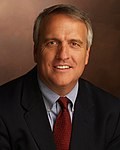Campaign
With popular two-term Governor Bill Owens barred from seeking re-election, an open race developed for the Republican nomination to succeed him. The race looked like it would be between Congressman Bob Beauprez, who represented the swingy Denver suburbs in Congress, and former University of Denver President Marc Holtzman. The race between Beauprez and Holtzman was contentious. Beauprez accused Holtzman of ethics violations, including making false allegations that the campaign's email list was stolen, [7] providing falsified poll results to the Denver Post , and using a separate state campaign committee as a "shadow gubernatorial campaign." [8] Holtzman, meanwhile, accused Beauprez of being part of the "politics of power" that he argued had taken the party away from its conservative values, pointing to Beauprez's support of Referendum C in 2005, which allowed the state to hold onto excess tax revenues rather than refund surpluses. [9]
In the end, the campaign between the two frontrunners fizzled. Beauprez won a landslide victory at the state Republican convention, denying Holtzman a spot on the ballot. Holtzman's efforts to collect signatures to win a spot on the ballot were ultimately in vain, with the Colorado Supreme Court ruling in June that he had failed to submit enough signatures. In response, Holtzman suspended his campaign and endorsed Beauprez, who won the Republican primary unopposed. [7]



